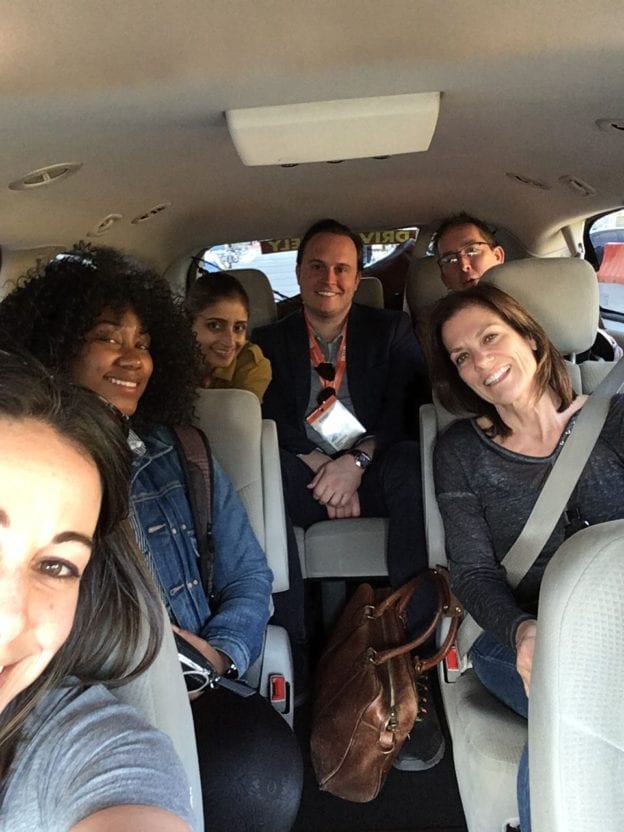
This blog is written reposted from Richland Source's Rising from Rust: SXSW series, and was written by Chelsie Thompson, our organization's President and one of 15 individuals attending the South By Southwest Conference in Austin with the intention to bring back ideas and to reimagine Richland County. To read more SXSW blogs, click here.
On more than one occasion, I've made the mistake of telling my boss that I value professional development more than anything else in a job... and then have had to quickly walk back that statement to make sure he knows I like getting paid, too. But it’s true -- I love learning, and for someone who values it so much, this week in Texas at South by Southwest has been the experience of a lifetime.
We started our journey at SXSW as fifteen (mostly) strangers. Every one of these incredible Mansfielders brought something different to the group, and having the chance to get to know them all has only made me admire them more. We're leaving as friends, comrades who survived the trenches of SXSW, with a shared vision and purpose for the work ahead. We've heard from speakers from around the world, celebrities to federal officials to multi-million dollar marketers, and there is so much to bring back to our home city from each of them.
In six days, I tackled nearly two dozen of SXSW's most promising sessions, and remarkably, every single one somehow touched on a common theme: the cities that are successful throughout the world are the ones that are minimizing the differences that separate them and embracing their shared humanity instead. They ask questions, listen to every voice and involve their citizens in the action. Take these comments from chef and "Bizarre Foods" host Andrew Zimmern on the experience of his addiction in early life and how it shaped this perspective for him personally.
"I had to go to places to sleep at night, I had to go places to get meals because I was living on the street. I was the guy you crossed the street to avoid," he said.
"After getting back on my feet and cooking as a nobody in restaurants, I kept feeling like I had to find a way to teach the world about patience, tolerance and understanding because I kept noticing throughout each restaurant that the way people talked about culture was only in terms of the ways that we were divided... In listening, one gains an understanding of the world. We all have to think about ourselves and how we fit into this, but the minute we get out if our heads and ask more questions, it's a powerful experience."
In everything he said, both Zimmern and his co-panelist, fellow chef José Andrés, emphasized respect for our fellow human beings. So often, we believe that we know what's best for others, and without stopping to listen to what people actually want or need, we implement our solution. Andrés cited his trip to Haiti to aid after the 2010 earthquake.
"Beans, beans, everything there is black beans and that's all we had. I thought, how terrible, there's only beans, and this village hasn't eaten in days. So I added rice, and gave them this bean and rice dish," he said. "When I'm serving the stew I made, they all gathered around the translator... What do they want to tell me? That the beans are no good. It turns out they like their beans like a purée."
In Andrés's words, "It's not helping when people impose what they think you need," yet the loudest voices are often those who haven't stopped to listen.
In a keynote with writer Ta-Nehisi Coates, I learned about how the moral arc of a city bends towards chaos, not justice, and how social media has made it too easy to spread negativity far and wide. Whether they admit it or not, people say things that they wouldn't otherwise say to someone directly under the guise of "honesty" without thought of respect. For those that hide behind this, there may never be change -- and that's okay -- because their voices become minimized when the rest of the community comes together. But for those brave enough to step out from under this cloak of anonymity and participate in dialogue that is open and well-intentioned, they play a part in a larger cause, one that has the potential to impact tens of thousands in the place that they call home.
Ira Glass said, "Every good story has forward momentum of events." This is our opportunity to be part of that momentum, to have a voice in our future, to step out of the negativity that has pervaded Mansfield for too long, and to propel the city forward. Our city has a story to tell, and this is just the beginning."